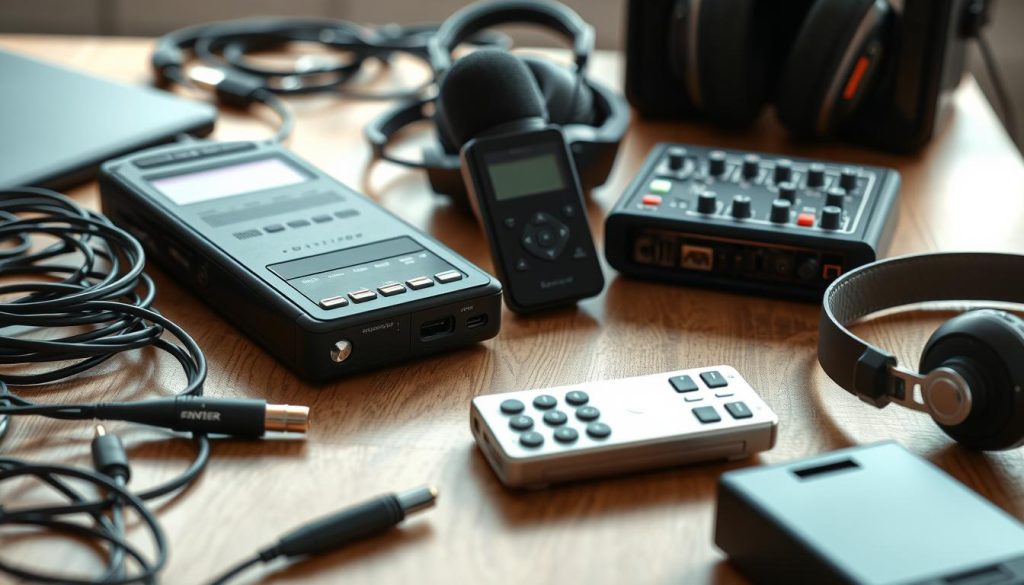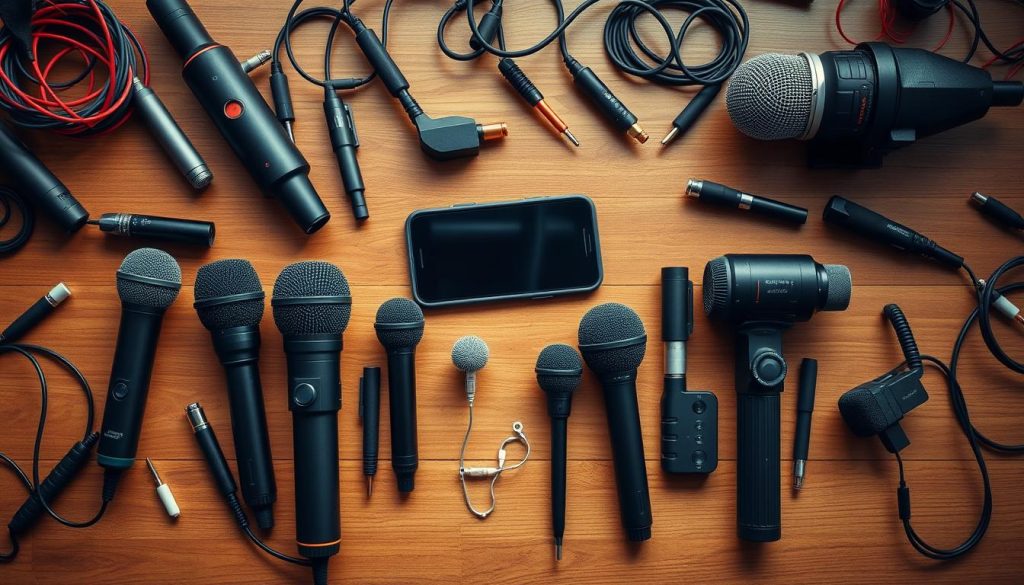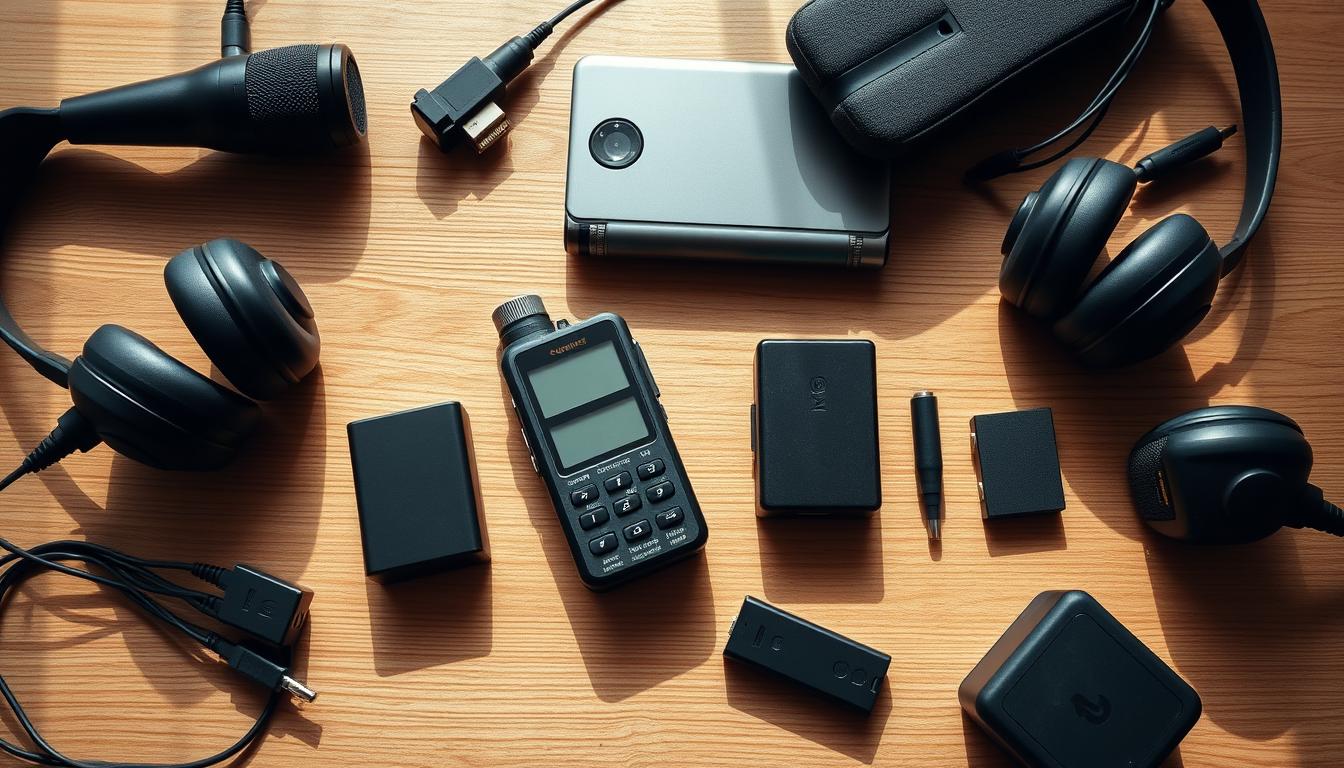I love making content, podcasting, and playing music. I always search for the best portable recording gear. This gear helps me get great audio anywhere, anytime. I’ll share my favorite portable audio solutions that improve your sound and make recording easy, wherever you go.
I’ll talk about everything from multi-track recorders to microphones for smartphones. By the end, you’ll know how to pick the right gear for you. This is great for podcasters, musicians, or anyone making content.
Why You Should Invest in Portable Recording Equipment
In today’s fast world, capturing high-quality audio on the go is key. Smartphones help, but dedicated portable recorders offer big advantages. They go beyond what apps can do.
The Benefits of On-the-Go Audio Capture
Portable recorders are great for many things like interviews, lectures, and creative projects. They give you better sound quality than most apps. This is thanks to their advanced mics, preamps, and processing.
They also last a long time on one charge. This means you can record for hours without running out of power. This is perfect for long interviews or recording in the field with no power.
When a Smartphone App Just Won’t Cut It
Smartphone apps are good for quick recordings, but they’re not always enough for serious audio work. They often don’t match the quality of portable recorders. These devices have better storage and settings for your recordings.
If you often need to record high-quality audio, a portable recorder is a smart choice. They offer better sound, longer battery life, and special features. This makes them a great tool for anyone who records audio often.
Portable Recording Equipment: My Top Picks

I love audio and have looked into the latest portable recorders from brands like Zoom, Tascam, and Olympus. I talked to experts and checked out the features that matter most. Now, I’m excited to share my top picks for the best portable recorders for capturing great audio anywhere.
Key Features to Look For
When picking a portable recorder, think about a few key things. First, make sure it can record audio clearly and with depth. It should also have a readable display, even in bright or dim light.
File management and storage space are also key. You’ll want to organize your audio easily and have enough space for long recordings. And, the battery life is important, so it doesn’t run out fast.
Finally, think about how versatile the recorder is. Look for one that works well in different situations, like interviews or live music. Keeping these things in mind helps you find the best portable recorders for your needs and budget.
I looked at the latest market and talked to audio experts to find the best portable recorders. They offer great sound quality, are easy to use, and have all the features you need. These top picks are perfect for content creators, musicians, or anyone who likes to record audio on the go.
The Best Portable Multi-Track Recorder for Songwriters
As a songwriter, it’s key to record high-quality, multi-track songs on the go. After lots of research and testing, I found the best portable recorder for musicians. It’s the Zoom H6 Six-Track Portable Recorder.
The Zoom H6 is great for songwriting demos. It lets musicians record many instruments or vocals at once. It’s small and easy to carry, but still records six tracks at once. This means you can make complex song demos without losing sound quality.
- Record up to six tracks at once with the included X/Y microphone and four more inputs
- Supports high-resolution 24-bit/96kHz audio for clear recordings
- It’s compact and light, with a strong metal body, perfect for traveling
- Has easy controls and a big, backlit LCD screen for use in any light
- Can be powered by AA batteries or an AC adapter for long recording times
The Zoom H6 is ideal for recording acoustic guitar, vocals, synth parts, or a whole band. It’s the best portable recorder for songwriters and musicians. It fits easily into your creative process, helping you make top-notch demos anywhere.
Top Mobile Microphones for Content Creators

As a content creator, the right audio gear can change everything. Mobile microphones are key for great audio on the move. They range from wireless lavalier mics to compact shotgun mics for phones. These options can really improve your audio.
Lavalier and Wireless Mic Options
Lavalier mics are small and easy to use. They’re great for getting clear, close-up audio without the need for a mic. Many top mobile microphones are wireless, letting you move around freely. They connect easily with your phone, giving you great audio without wires.
Smartphone-Friendly Shotgun Mics
Compact shotgun mics for smartphones are great for focused audio. They clip onto your phone and pick up sound from where you want it. They’re perfect for vlogs or podcasts, giving you pro-quality audio anywhere.
| Microphone Type | Key Features | Best For |
|---|---|---|
| Wireless Lavalier Mic | Compact, discreet design; wireless connectivity; easy pairing with smartphones | Vlogging, interviews, podcasting |
| Compact Shotgun Mic | Directional audio pickup; easy smartphone mounting; rejects ambient noise | Filming videos, recording podcasts |
Using Traditional Mics with Your Smartphone
Mobile-friendly microphones make recording easy, but sometimes you might want to use your pro gear with your phone. With the right adapters and cables, you can connect your XLR or USB mics to your phone. This lets you record with a wider range of options.
Adapters and Cables Needed
To connect your traditional mics to your smartphone, you’ll need some special gear:
- A TRRS (Tip-Ring-Ring-Sleeve) to XLR adapter or cable. This lets you plug an XLR mic into your phone’s headphone jack.
- A USB to TRRS adapter or cable. This connects a USB mic to your phone’s charging port or headphone jack.
- You might also need a phantom power supply for your XLR mic, depending on your setup.
These adapters and cables are easy to find. They let you connect external mics to smartphones and use pro audio gear with mobile devices. This gives you better recording options on the go.
With the right adapters for TRRS/TRS connectors, you can add your favorite mics to your phone setup. This opens up new creative possibilities wherever you are.
Connecting USB Microphones to Phones
Connecting a USB microphone to your smartphone might seem easy, but you often need extra gear. Whether you’re using an Android or iOS device, there are adapters that make it work well. These adapters let you use your favorite USB mics for recording on the go.
For Android users, you’ll usually need a USB-C to USB adapter or a USB-C hub. This setup lets you plug your USB microphone right into your Android phone or tablet. Good choices include the UGREEN USB-C Hub and the Anker USB-C to USB 3.0 Adapter. Both offer the right connections for your USB mic.
On iOS, you’ll need Apple’s Lightning to USB Camera Adapter for iPhones and iPads. This small adapter connects to your device’s Lightning port and gives you a USB-A port for your mic. Or, if your device is newer, you can use a USB-C to Lightning adapter.

